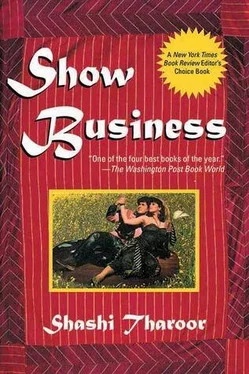And I would wash my ugly and callused hands. Incessantly, obsessively, wash them. I would make repeated visits to every bathroom in the rich guy’s house and wash my hands, running creamy soap over the rough skin, over fingernails I had nervously bitten down to the very edges. I can’t remember very much else of what I did at those places, but I would always come home with the cleanest hands in Bombay, the skin of my palms white-dry and wrinkled with all the water I’d poured on them, fragrant with the delicious, unattainable, unplaceable smell of imported soap.
I hate my hands, Ashok. I hate their shortness, their stubbiness, their roughness, their virtual lack of nails. That’s probably a genetic trait: I come from a long line of insecure, nail-biting failures. Your long fingers, your hard and gleaming nails — what a thing to envy you for, Ashok Banjara. But I do.
None of this means anything to you, does it, Ashok? Hell, why blame you. You’ve never stumbled into a big star’s closet and found the most incredible collection of ties in the world, a real parade of ties, red and black and blue ties, ties with stripes of every known width and color, plain ties and polka-dotted ties, ties with the badge or shield of an exclusive club on them, ties in silk and rayon and polyester and cotton, broad ties and narrow ties, ties with discreet little designs and ties with psychedelic patterns. The most pointless article of clothing in the world, devoid of purpose, an anachronism even in the climates where it’s wearable, a flagrant luxury in our country: what an advertisement for this star’s success, that he could afford to throw away so much money on so many useless foreign ties! You wouldn’t understand what I felt, Ashok Banjara. You’ve never reached up, awestruck, to touch these ties and brought the entire rack down on your head so that you sat swathed in a riot of colors, held down by a dharna of textures, trapped in a gherao of ties. You’ve never bent down to pick them up, one by incredible one, and rearranged them lovingly in that remote stranger’s closet, knowing the distance that stretches between that stranger’s world and your own, even as you touch and feel the dimensions of that distance. You’ve never vowed, Ashok Banjara, that one day you, too, will possess a collection of ties like that, more ties than you will ever find occasion to wear.
What do you know, Ashok Banjara, you for whom a tie was an object of routine daily wear, something you had to put on to go to the office, not a magical symbol of material success?
What do you know of living in some godforsaken matchbox in a decrepit old building and traveling two hours to make it in time for the nine o’clock shift? What do you know of sitting around the Prithvi Café, drinking oversweet cups of tea because you’ve got nothing else to do, and drinking them as slowly as possible because you can’t afford to keep ordering more, and you can’t afford to leave? What do you know of the cut-and-crimp tailors of Linking Road, Bandra, who are the world champions at prolonging the life of your old clothes, lengthening, tightening, reversing, adding, patching them into posterity, and who can imitate any star’s costume for you at a sixth the price? What gives you the right, Ashok Banjara, to be one of us?
You’ve never forgiven me, of course, for knowing Maya before you did. I can understand that. She wasn’t the kind of girl I could have expected to meet, let alone be close to. My woman, my only regular woman, really, during those first years in the industry, was Sunita. I know some people called her my wife, but of course we weren’t married. I mean, who would marry a vamp? Sure I lived with her for a while, but it was a practical arrangement, you know, and I also lived away from her just as much. I don’t want any more of that Pranay-dumped-his-wife stuff being flung at me. Sunita wasn’t my wife. And in the circumstances of her life and work, she couldn’t be anyone’s wife. Really.
I mean, look at her life. Sincerely, would you have married her? OK, not you, Ashok Banjara, Esq., but anyone? She comes out of some Gujarati hick town, Jamnagar or Junagadh or somewhere, the kind of town where the biggest thing around is the cinema theater, it’s the only place of escape. So what does she do when she’s had enough of this backwater? She gets into a train one day with her life’s savings tucked into her cleavage to make it in the only other world she can imagine, the fantasyland of Bollywood. Sunita knows that her only assets are those contained in her blouse, and I’m not referring to the grimy notes she has spent within a week of arriving in the city. So she does the round of the producers’ offices, and she wears out the hook of her one good bra in a succession of sleazy hotels. Soon she is doing the bump and grind vertically too, for a change, as one of the half dozen sidekicks of the principal vamp in some sizzling dance number. She does it well, she has practiced all the moves, and she is known to be willing to oblige the producer anytime he wants a special favor. Nothing unusual about that — hell, they are all equally willing, but they’re not all as worthy of crumpling the producers’ sheets as Sunita is. So she gets her breaks; she rises from the ranks of the secondary vamps till she is doing her own cabaret numbers. Solo, or in duets with a villain. Like me. Yes, that’s how I met her.
She had a heart of gold, Sunita. She took me in, showed me more kindness than I deserved, gave me free run of her flat and her body. She looked on sex as some sort of divine gift to women, a commodity that was easy to offer, cost nothing to give, and brought in great rewards. “It’s not much work and it seems to make them so happy,” she said innocently to me once. “Imagine if some producer wanted me to sweep his floors instead, or clean out his bathroom. Now that would be much more difficult. I’d hate to do that, even for a role. But to give him sex? It’s so easy, and sometimes it’s even fun.”
You think I’m making this up, don’t you? You’ve heard all the stories about how much these women suffer, how they endure the humiliation with teeth clenched and eyes closed, only the thought of their starving babies keeping them on the bed while the raunchy paunchy producer heaves and pants over them. Well, I’m not denying that that does happen, there are some women like that, but for the most part, my friend, they know precisely what they’re doing and why. Sunita did.
Thing is, once people expect it from you it’s kind of difficult to stop. Sunita had been giving herself so readily that the mere fact of my moving in couldn’t change the pattern. There was one producer who cast her in his films on one condition: that after the shooting was over, she would repeat the dance number for him in a private performance, this time without any clothes on. He’d set it all up, playback track, lights and all, and she’d repeat exactly the same moves, choreographed by Gopi Master or Sonia Bibi or whoever, minus her costume. Drove him wild, of course. When he called out “Action!” afterward, it was an announcement of his own intent.
What Sunita didn’t know was that the camera that stood there, supposedly as a prop — something he could look through and imagine himself directing — actually had film in it. Film which he then screened for his intimates. We found out when I walked in on one of the showings, at the producer’s place. Had some sort of errand to run, message to deliver or something, and they let me into his sanctum sanctorum, a bar with mirrored walls and a projection unit. So I walked in and found my wife, sorry I mean the woman I was living with, shaking her bare breasts at me from every reflectable angle and a bunch of old drunks slapping their thighs in delight. I went back and told her, and then I walked out of her life. Well, sort of. I walked out, but not for the last time. Sunita was a girl you kept going back to. Like she said, it didn’t cost you anything.
Читать дальше












